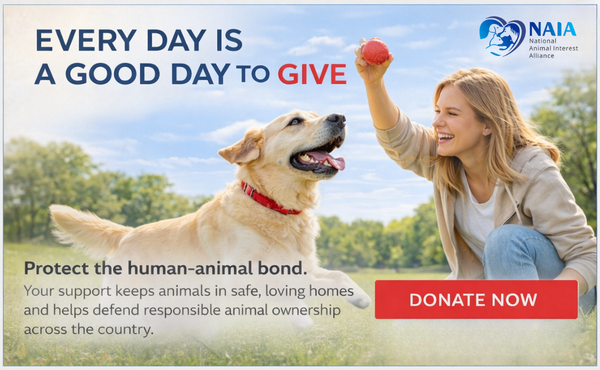
Guardianship
Policy statement: Guardianship
Do we own our pets, working animals, and livestock? Or are they on loan from the government? Can we make decisions about the housing, care, and training of our dogs, cats, and other pets, or are we subject to second-guessing by public officials and activist humane agents who would redefine cruelty and neglect?
In all but a few US jurisdictions, animals are considered personal property and owners are given the right as well as the responsibility to provide for their well-being. In a handful of cities and one state ( Rhode Island) where guardianship laws have been passed, animal ownership has become a fuzzy issue that may lead to situations where government can revoke guardianship for violation of an ever-increasing list of forbidden or restricted practices.
The guardianship campaign is run by animal rights activists who believe that animals should not be owned or used by human beings. Publicly, these radicals equate animal ownership with human slavery and claim that a change from “owner” to “guardian” in laws and legal documents will result in better treatment for animals. Privately, they oppose pet breeding, animal sports, animal-based research, animals in entertainment and raising animals for food and fiber, and they plan to use guardian laws to tighten restrictions on animal use and ban activities they don’t like.
NAIA stands with owners
NAIA supports laws that protect animals from abuse, neglect and cruelty (animal welfare) but opposes the political campaign to give legal rights to animals (animal rights).
NAIA believes that the concept of private property is inviolate and opposes any campaign to undermine this fundamental American right. We further believe that comparisons with human slavery are hateful and insulting. As a result, we oppose the guardianship campaign because it ...
- interferes with private contracts between buyers and sellers;
- may result in loss of well-loved animals;
- will do nothing to improve animal care;
- could interfere with biomedical research involving animals, which is already strictly regulated by the federal government;
- could interfere with farmer’s decisions about animal husbandry practices such as dehorning cattle or docking sheep tails;
- has the potential to clog courts with specious cases;
- will do nothing to get stray animals off the streets; and
- bases all animal care decisions on the preferences of a minority group of activists, not on experience of animal owners, trainers, and scientists who are part of the majority.
As proponents of animal welfare, NAIA abhors cruel and negligent treatment of animals and believes that those responsible for abusive acts should be prosecuted. We encourage communities to steer clear of quick fixes that are part of a political agenda and instead adopt laws that clearly define animal cruelty and neglect and hold animal owners accountable for violations.
Be sure to see these additional NAIA policy statements
Pet Ownership / Dogs / Pets and the Community / Guardianship / Animals in Entertainment
Animal husbandry / Animal Careers / Agriculture / Research / Wildlife / Mandatory Spay/Neuter Legislation
Stay Connected with The NAIA: Sign Up for The Weekly Roundup
Join our FREE newsletter and community of animal advocates and receive The NAIA Weekly Roundup straight to your inbox. Stay in the loop with the latest news, events, and ways you can make a difference in the lives of animals. Sign up now to stay informed to create positive change!
Sign Up


